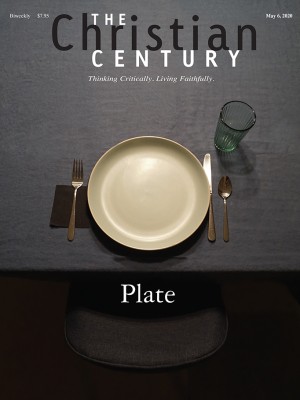May 10, Easter 5 (Acts 7:55–60; Psalm 31:1–5, 15–16)
Are we guilty of throwing stones or of watching coats?
On May 22, 1917, in my hometown of Memphis, Tennessee, a mob lynched Ell Persons. Reports indicated that 5,000 people showed up to participate or watch. Persons was tied to a log, doused with gasoline, and set on fire. According to newspaper reports, his death was slow and agonizing. The crowd cheered as the smell of burnt flesh filled the air. After he died, they mutilated his body.
When I read the story of Stephen, I cannot help but think of Persons and the many other people who were lynched by mobs. We typically preach this as the story of Stephen the perfect martyr, the one who selflessly accepted his call to serve. But in this story we also see that when Stephen’s faith called on him to bear witness to the gospel, not everyone was receptive to his message. Being faithful to the gospel got Stephen into trouble, and we should spend some time discussing that trouble.
Read our latest issue or browse back issues.
Instead, we often rush quickly to the “good news” of the text. We might say that when we doubt we have taken the right stand, God gives us confirmation. Or we remind people that even in the stoning pits of life, we don’t stand alone—that the Jesus who sits at the right hand of God also stands on our behalf. He goes through the turmoil with us, stone for stone. We are never alone. Jesus goes with us, and even when people cover their ears and don’t want to hear us anymore, deaf with hate and rage, the Son of humanity still stands and goes through it with us.
This is indeed good news. But what about the other characters in the story?
There is of course the mob, the people throwing stones. These are not people we might expect to act this way. These are religious folks, and apparently they have a problem with who Stephen is. In Acts 6 it seems Stephen’s only crime is performing “great wonders and signs among the people.” The religious folks begin to argue with him, and then they decide to persuade some folks to lie about him. That’s how he ends up before the council.
How do we, as good religious folks, sometimes act as a mob? The overwhelming majority of the people at Ell Persons’s lynching were good church folks. They were people of faith. They even had a minister there—a man known as “Brother Royal,” who declined to pray for Persons or to even allow Persons to pray for himself. I wonder how many lies people told in order for Persons to be there that day. While many of us will never be guilty of lynching another human, how have we been guilty of throwing our own stones?
The other character in the text is Saul. He doesn’t throw any stones, but he watches the coats. He doesn’t get his hands dirty, but he sees what is going on. He doesn’t yell and scream, but he hears the yells and screams. He doesn’t do the deed, but he approves it.
By standing by and doing nothing, Saul gives validity to what the mob is doing. We can see ourselves in him. Even when we didn’t throw the stones, we may have known what was happening and known that it was wrong. We stood and watched and held the coats.
Life is full of decisions big and small, and we can’t avoid making them. The decision to stand and do nothing but watch and hold coats is itself a decision. When we sit on the fence, walk the tightrope, try to play the middle, or hide behind not making a decision, we make a decision to watch and to hold coats.
The story of Stephen shows us that many times the mob and the coat watchers are us. It teaches that we good church folks are the ones who stand in need of forgiveness and mercy. It also demonstrates something else we don’t talk about enough in our churches: sometimes the mob wins, at least for the moment.
I can’t help but wonder if Stephen or Persons silently recited Psalm 31, a psalm asking for deliverance from one’s enemies: “Rescue me speedily. Be a rock of refuge for me, a strong fortress to save me.” But when deliverance does not come on this side of eternity, the good news is that we can commit our spirit into the hands of the one who has already prepared a place for us—the one who stands with us in the stoning pits of life, the one ready to redeem and forgive us if we are guilty of throwing stones and watching coats.






